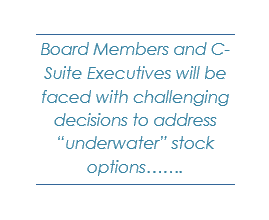Background
COVID-19 has created significant market volatility resulting in sharp decreases in corporate valuations for both public and private companies. Board Members and C-Suite Executives will be faced with challenging decisions to address “underwater” stock options that have lost retention and incentive value to employees. In addition, other members of the accounting and finance team will be responsible for modeling the potential impact of these decisions on the Company financial statements, executing on any modification paperwork and operationalizing the current and future accounting treatment.
The Negative Impact of Underwater Options
Stock options, which are typically issued to employees as incentive compensation, become underwater when their exercise price exceeds the current market value of the underlying shares. Significant declines in value can make previously issued stock options effectively worthless, wreaking havoc on employee morale and potentially leading to increased employee turnover. This is of particular concern to high-growth companies where equity compensation is a critical component in retaining and incentivizing talented people. Meanwhile, companies are still required to recognize expense for underwater options based upon their original grant date fair value, resulting in continued compensation expense without the motivation and retention benefit originally intended by the awards.

Developing an Exchange or Repricing Strategy
In response, companies may consider repricing or otherwise replacing underwater stock options with new equity awards. If current market declines and economic uncertainty persists, discussions on option repricing programs and how companies can best restore equity incentives to employees are likely to be revived. During the 2008 financial crisis and aftermath, repricing discussions and initiatives became common on a wide scale. While management may typically be reluctant to reset equity awards due to negative market and public perceptions, in times of broad market declines there tends to be less resistance to such measures.
However, as beneficial as an option repricing may be in restoring employee incentives, there can be costly pitfalls if mismanaged. A well-developed strategy that involves communication of the intent and impact to both shareholders and employees is critical to a successful repricing or exchange program. Balancing shareholder concerns and gaining their support will be vital, especially if their approval is required. In order to choose the approach that best aligns the interests of all parties, management will need to understand all potential solutions, the financial implications and the potential dilutive impact. Valuation, exchange ratios and, vesting, and performance conditions will be critical factors in determining the appropriate method for executing a particular strategy.
Option Repricing Methods
The goal of any repricing strategy is to reestablish the incentive and retention component of the company’s equity compensation plan for its employees. Option-for-option exchanges are likely to remain a popular choice in this regard. Companies can perform a “one-for-one” stock option repricing, where the exercise price of underwater options are decreased, typically to the fair market value of the underlying share on the modification date, while the other terms of the options remain the same. However, with a one-for-one repricing, there is generally an incremental compensation charge under current accounting rules, making this approach less attractive to shareholders, investors and proxy advisory firms.
 A “value-for-value” or “value neutral” repricing program is typically preferred, where the underwater stock option awards are exchanged for new stock options with a lower exercise price and fewer covered shares, resulting in an exchange ratio of less than one-for-one. Since less options are issued and the “fair value” of the new stock options will generally be the same as or very close to the fair value of the original (underwater) stock options, the incremental compensation expense impact will be minimized and there is less dilution to a company’s shareholders. While this strategy might be appealing to the Board of Directors, shareholders and executives, communication of the option “fair value” concept to the holders can be difficult.
A “value-for-value” or “value neutral” repricing program is typically preferred, where the underwater stock option awards are exchanged for new stock options with a lower exercise price and fewer covered shares, resulting in an exchange ratio of less than one-for-one. Since less options are issued and the “fair value” of the new stock options will generally be the same as or very close to the fair value of the original (underwater) stock options, the incremental compensation expense impact will be minimized and there is less dilution to a company’s shareholders. While this strategy might be appealing to the Board of Directors, shareholders and executives, communication of the option “fair value” concept to the holders can be difficult.
To appease shareholders and find a proper balance, companies can also consider modified exchange approaches, such as offering new options with an exercise price greater than the current market value of the stock but less than the original award exercise price or adding additional vesting conditions to the new awards.
Exchange programs can also be made for other equity award types, such as restricted stock or restricted stock awards or restricted stock units, using a similar value-to-value exchange approach.
Finally, an alternative approach to repricing options can include keeping the original options intact and issuing additional stock-based awards to cover the loss in value of the underwater stock options. Vesting conditions can be added to the new awards to delay the additional accounting expense related to this strategy, however the dilutive impact will be a critical factor in determining of this is the right approach.
Additional Considerations 
Once management selects a repricing approach, it will need to determine what option holders and which options will be eligible to participate in the program. Including officers and director awards in the repricing program may impact shareholder approval (if required), and generally only options that are significantly out of the money should be included in the repricing. Management will need to consider the timing of the option repricing and continued market volatility and avoid the perception of capitalizing on a short-term dip in valuation or providing for outsized employee compensation rewards upon a quick market rebound.
Modeling the impact of all strategies considered will be critical in making the appropriate decision and these decisions will likely impact the structure of equity awards to be issued in the future.
Modeling the Impact
Ultimately, the decision makers at your company will need to understand the impact of the strategies at their disposal. Depending on the strategy selected your company may see an impact on dilution, stock-based compensation expense, or a combination of the two.
Dilutive impact will occur with instances where additional awards are given as consideration. The dilutive impact will be in the increase of shares to your award pool in order to give out additional options. If portions of your exiting option pool can be used to issue out additional consideration, the impact to your fully diluted shares can be minimized.
Stock based compensation impact will occur in instances where options are repriced so that the exercise price is lowered to a price below the current exercise price. In accounting these are considered type 1 modifications where no previous expense recognized or projected will be reversed and there may be an incremental expense for the replacement grant. The incremental expense is measured at the fair value of the  grant directly before and after the application of the modification. In these instances, companies will likely recognize the greatest impact to additional stock-based compensation expense in the expense period the repricing occurs. Then in future expense periods, the company will continue to recognize an additional incremental expense until the grant is fully vested
grant directly before and after the application of the modification. In these instances, companies will likely recognize the greatest impact to additional stock-based compensation expense in the expense period the repricing occurs. Then in future expense periods, the company will continue to recognize an additional incremental expense until the grant is fully vested
Modeling these scenarios accurately will be instrumental in arming your executives and board with the proper information to move forward. If you are fortunate enough to have your capitalization table on a software solution such as Carta, this process can be significantly more accurate and streamlined. Companies using Carta to implement a stock option exchange or repricing program are strongly recommended to work with Carta’s Support team to make the necessary system updates, who can help model the impact to ensure updates flow through properly.
Conclusion
Responses to the COVID-19 outbreak continue to rapidly evolve. As the economy looks beyond COVID-19 and begins to reopen in the coming months, hopefully a clearer picture of the near-term economic outlook begins to form. If current valuations remain in the shadows of prior highs, it may be a good time for companies to start developing a strategy to address underwater stock options. Having knowledgeable partners to help guide management through the modeling, valuation and decision-making process, as well as an all-in-one equity system solution will help ensure a fully vetted strategy.
About ARC Consulting LLC
ARC Consulting is a premier accounting advisory firm based in San Francisco, staffed with technical experts with a mix of practical industry experience. The professionals of ARC Consulting are here to help you navigate today’s complex accounting, reporting and compliance environment. We can assist with projects that require a high level of technical knowledge regarding authoritative literature, including generally accepted accounting principles in the United States (“US GAAP”) and guidance from the Securities and Exchange Commission (“SEC”). Our service offerings include implementation of US GAAP, audit preparation, IPO readiness, SEC assistance, acquisition due diligence, purchase accounting, systems and process, and financial analysis.
ARC Consulting, LLC does not provide tax, legal, or investment advice. All material has been prepared for informational purposes only, and is not intended to substitute, and should not be relied on for tax, legal, or investment advice. You should consult an independent tax advisor, lawyer, or financial advisor before engaging in any transaction. For more information, visit arcconsultingllc.com or contact Gary Klintworth, Managing Director at gary@arcconsultingllc.com
About Carta
Carta is a software platform that allows founders, investors, and employees to manage equity and ownership. Companies like Robinhood, Tilray, and Union Square Ventures use Carta to manage their cap tables, valuations, portfolio investments, and equity plans. Since its inception in 2012, more than 14,000 companies, 800,000 shareholders and Venture Capital firms have trusted Carta to manage hundreds of billions of dollars in equity. Carta’s goal is to transform private markets by increasing liquidity and transparency between shareholders.
Founded in 2012, Carta has raised $447.8 million from top investors, including Andreessen Horowitz, Lightspeed Venture Partners, Goldman Sachs, Meritech Capital, and more. Carta is an SEC-registered transfer agent. For more information, visit carta.com or contact us at partnersales@carta.com.
Contact Us:
ARC


CARTA :

partnersales@carta.com
For more information: https://carta.com/referral/#ARCConsulting











Sorry, the comment form is closed at this time.